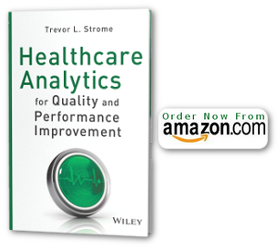Analytics is changing how health care organizations (HCOs) improve clinical quality, operational efficiency and patient safety. Unfortunately, many HCOs may not be fully benefiting from the potential goldmine of useful information made possible by computerized records and analytics resources (including specialists and software) within their organizations. In my recent article posted on the Health IT Exchange, I discussed how to ensure that analytics are a strategic resource for healthcare transformation and operations excellence, and not merely a “report repository’.
The following are three of the lessons learned by HCOs seeking to leverage analytics on Quality Improvement initiatives (check out the article for the full list):
- Consider analytics from the start. Avoid analytics becoming an “afterthought,” – consider the information and analysis needs for a QI initiative from the time planning of the initiative starts, not when it is well underway.
- Focus on information needs of end-users. When developing analytical applications and BI tools, know which stakeholders require what information, at what frequency, and in what format.
- Innovate. Analytics and BI offer so much more than reporting – be sure to use available tools to their maximum potential. This can range from making information tools more intelligent by highlighting where and alerting when certain defined conditions occur, through to the use of simulation modeling to test new workflows and processes prior to implementation.

{ 0 comments… add one now }